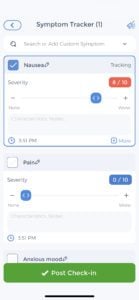
You may be feeling nauseous and tired all the time because of a health condition that you are unaware of. Symptom tracking with the CareClinic app can help you to determine the cause of your symptoms. CareClinic can track your symptoms over time, and it can provide information about what each symptom might mean. This can help you to determine if you have a health condition that needs to be treated.
If you are feeling nauseous and tired all the time, it is important to see a doctor for a diagnosis. By tracking your symptoms with CareClinic, you can provide your doctor with valuable information that will help to determine the cause of your symptoms.
Table of Contents
- Common Causes of Feeling Nauseous and Tired All The Time
- Effects of Nausea and Tiredness on Everyday Life
- Sleep is critical to reducing fatigue
- Endocrine and Metabolic Factors
- The Role of Nutrition and Water Intake in Feeling Nauseous and Tired
- Chronic Conditions Associated With Nausea and Fatigue
- Tips to Reduce Feelings of Nausea and Tiredness
- Morning Sickness
- Can High Blood Pressure Cause Fatigue?
- Can Pregnancy Cause Tiredness and Nausea?
- Do you also have a fever?
- Is it a hangover?
- Symptom Tracking Helps Manage Feelings of Nausea and Fatigue
- Conclusion
Common Causes of Feeling Nauseous and Tired All The Time
You may be feeling nauseous and tired all the time because of one of the following reasons:
1. You are dehydrated.
2. You are not getting enough sleep.
3. You are not eating enough healthy foods.
4. You are stressed out.
If you are experiencing these symptoms on a regular basis, it is important to track them using an app like CareClinic. This will help you determine the root cause of your symptoms and allow you to get the treatment you need.
Effects of Nausea and Tiredness on Everyday Life
When you’re feeling nauseous and tired all the time, it can be tough to get through your day-to-day tasks. You may find it difficult to focus on your work, and you may be tempted to take naps throughout the day. Your appetite may also be reduced, which can lead to weight loss.
In addition, fatigue and nausea can cause mood swings and make you feel irritable and stressed. If these symptoms persist, it may be a sign that you are suffering from an underlying health condition that needs to be addressed.[1]
Sleep is critical to reducing fatigue
Sleep is an important factor in feeling well. It helps to recharge your body and mind, allowing you to perform better throughout the day. If you are feeling nauseous and tired all the time, it may be a sign that you are not getting enough sleep. When you sleep your body repairs itself and releases hormones that regulate your mood. Hormones such as cortisol and adrenaline are also released when you don’t get enough sleep, which can cause chronic fatigue.
To improve your sleep quality, it is important to establish a consistent bedtime routine. This may include avoiding caffeine late in the day, limiting screen time before bed, and sleeping in a dark room. Physical activity during the day can also help you to sleep better at night as well. Another less common issue such as jet lag can also cause nausea and tiredness, however, this is usually only temporary.
In addition to physical causes, there can also be psychological factors that cause you to feel nauseous and tired all the time. Stress and anxiety can lead to fatigue, nausea and difficulty sleeping. If these symptoms persist, it may be a sign of depression or another mental health disorder. Consider mindfulness or other types of therapy to address your mental health or seek professional help if you catch yourself experiencing extreme fatigue.
Additionally, it is beneficial to track your sleep using an app like CareClinic. This will help you identify any patterns that could be contributing to your tiredness and nausea.[2][3][4]
Endocrine and Metabolic Factors
In some cases, feeling nauseous and tired all the time may be caused by endocrine and metabolic factors. Your body produces hormones to regulate your energy levels, metabolism, and mood. If these hormones are not balanced properly, you may feel fatigued or run down no matter how much rest you get. This could be a sign of an underlying health condition like anemia, diabetes or thyroid disorder.
In these cases, it is important to speak to your doctor and have a physical examination. CareClinic can also help you keep track of your symptoms so that your doctor has all the information they need to make a diagnosis.[5]
The Role of Nutrition and Water Intake in Feeling Nauseous and Tired
When you are feeling nauseous and tired, the first thing to consider is your food and water intake.
Are you eating enough healthy foods? Are you drinking enough water? Are you eating too much junk food?
These are all important questions to ask because what you eat can have a significant impact on how you feel. If you are not getting enough nutrients, your body will not have the energy to function properly. And if you are constantly eating unhealthy foods, your body will become overloaded with toxins, which can make you feel sick.
Some generally well-tolerated foods to have while feelings nauseous include:
- Ginger
- Bananas
- Yogurt
- Applesauce
- Oatmeal
- Broth-based soups
It is also important to stay hydrated. Water helps your body flush out toxins, replenish lost electrolytes and regulate your temperature. Drinking plenty of water with electrolyte-rich beverages such as coconut water can help to reduce nausea and fatigue.
You may also consider an overall lifestyle change, where you try different diets to see which ones may help you sustain higher levels of energy. For example, a ketogenic diet or an intermittent fasting diet may also help to regulate your energy levels. A keto diet works by switching your body’s primary energy source from carbohydrates to fat, and an intermittent fasting diet works by restricting your eating times. A few other diets such as the Mediterranean diet, the raw food diet, and a vegan diet may also help you to sustain higher levels of energy.[6]
Chronic Conditions Associated With Nausea and Fatigue
While there are many potential causes of nausea and fatigue, there are a few chronic conditions that are associated with these symptoms. One such condition is anemia, which is a deficiency of red blood cells. This can lead to fatigue because the body doesn’t have enough oxygen-rich blood to supply its tissues. Another condition is hypothyroidism, which is an underactive thyroid gland.
This can cause fatigue and nausea because the body’s metabolism is slowed down.
Some other conditions that may trigger these physical symptoms and the reason why in the table below:
Chronic fatigue syndrome: The body doesn’t have enough energy to do everyday activities
Fibromyalgia: Muscle pain and fatigue
Irritable bowel syndrome: Abdominal pain, bloating, and changes in bowel habits
Migraine: severe headaches, often with nausea and sensitivity to light
Multiple sclerosis: Muscles weakness, problems with balance and coordination, fatigue
As you can see, there are many chronic conditions that can lead to nausea and fatigue. If you’re experiencing these symptoms on a regular basis, it’s important to see your doctor to rule out any underlying medical conditions.[7][8]
Tips to Reduce Feelings of Nausea and Tiredness

Here are 10 additional tips to reduce your symptoms:
1. Stay hydrated by drinking lots of fluids, especially water.
2. Get plenty of rest and sleep.
3. Eating smaller meals, eating frequent meals instead of large ones.
4. Avoid spicy or fatty foods.
5. Avoid strenuous activity.
6. Try symptom tracking to determine the root cause of your nausea and fatigue. The CareClinic app can help with this.
7. Drink ginger tea or take ginger supplements.
8. Eat foods that are easy to digest.
9. Use a heating pad on your stomach.
10. Try acupressure or acupuncture.
Taking supplements is one of the quickest ways to reduce fatigue. Vitamin B12 and iron can help to boost energy levels, as they support the body’s metabolic processes and promote oxygen circulation in the cells. Vitamin B12 helps with red blood cell production, which delivers oxygen-rich blood throughout the body for energy. Iron helps form hemoglobin and myoglobin, which transport oxygen to the cells. Taking the time to understand your body’s needs can go a long way in reducing feelings of nausea and tiredness.
Lifestyle habits such as proper nutrition, getting adequate rest, and reducing stress can all help to reduce feelings of nausea and tiredness. It is important to see your doctor so they can assess these treatments and make a correct diagnosis before starting.[9]
Morning Sickness
Morning sickness is a sensation of nausea and/or vomiting that often occurs during the early stages of pregnancy, but may also occur at other times. The cause of morning sickness is unknown, but it is thought to be related to changes in hormones. There are a number of ways to treat morning sickness, including dietary modifications mentioned above, medications, and complementary therapies.
Medications such as Vitamin B6, antihistamines, and antiemetics are commonly taken to reduce the symptoms of morning sickness. Vitamin B6 helps to increase serotonin levels in the brain, which can help reduce nausea. It is usually taken in conjunction with another medication called doxylamine, which is an antihistamine that works by blocking the action of certain chemicals in the body that can cause nausea. Antiemetics are medications that help to reduce vomiting and range from over-the-counter medications such as Dramamine to prescription medications such as Zofran. If you need help remembering when to take your medications click here.
If you are pregnant and experiencing morning sickness, it is important to speak with your healthcare provider about available treatment. If you want to try complementary therapies, consider ginger, acupuncture, or acupressure. All of these therapies have been shown to be safe and effective in reducing morning sickness symptoms.
Can High Blood Pressure Cause Fatigue?
High blood pressure is when the pressure of the blood against the walls of your arteries is too high. For some people, this can cause fatigue. When you have high blood pressure, it means that your heart has to work harder than normal to pump blood through your body. This can be caused by a lot of different things, such as eating too much salt, smoking, being overweight, or having a family history of high blood pressure.
Can Pregnancy Cause Tiredness and Nausea?
Yes, pregnancy can cause tiredness and nausea. During the early stages of pregnancy, it is common for women to experience what’s known as ‘morning sickness.’ Morning sickness is a sensation of nausea and vomiting that may occur during this time and can vary in severity from person to person. It’s thought that the cause of morning sickness is related to the hormonal changes that occur during pregnancy.
Tiredness and nausea can also be caused by the body’s demands for extra energy, nutrients, and fluids as it adjusts to being pregnant. To help cope with fatigue and morning sickness, women should make sure they eat a balanced diet with plenty of fruits, vegetables, and whole grains to provide the necessary nutrients needed during pregnancy. It is also important to get enough rest and reduce stress levels as much as possible.
Do you also have a fever?
If you have a fever in addition to feeling tired and nauseous, it is important to speak with your doctor or healthcare provider right away. A fever can be a sign of a more serious underlying health condition, so it is best to get an accurate diagnosis and treatment as soon as possible.
Is it a hangover?
A depressant is a type of chemical or substance that slows down the activity of the central nervous system, generally resulting in drowsiness, sedation, and feelings of relaxation. In terms of alcohol, it acts as a depressant by reducing the activity of certain neurotransmitters in the brain. This can affect how we perceive and respond to our environment, resulting in drowsiness, impaired coordination, and difficulty concentrating. If you are feeling tired and nauseous after consuming too much alcohol, it is likely a hangover. It is best to drink responsibly and stay hydrated while consuming alcohol.
If you consumed recreational drugs such as ecstasy, cocaine, or other stimulants, it is also possible that you are feeling the effects of these drugs. Stimulants can cause feelings of alertness and energy at first but can lead to exhaustion and nausea as they wear off. It is important to speak with a healthcare provider if you think you may be experiencing the effects of recreational drug use.
Symptom Tracking Helps Manage Feelings of Nausea and Fatigue

The CareClinic app is a great self-care App for symptom tracking. With CareClinic, you can easily track your symptoms, medications, and appointments all in one place. Plus, you can access your data from anywhere, which can be handy if you’re away from home or don’t have a computer handy. Your data also remains private and secure, so you can rest assured that your health information is safe.
CareClinic also offers helpful insights and personalized guidance to support you in managing your nausea and fatigue. If you’d like you can also see what is working for others for various conditions and symptoms along with the ability to share your own experiences electronically or by exporting your data for your caregiver to review.
Conclusion
If there is a medical emergency, always call 911 or go to the nearest hospital. Always talk to your doctor before trying any new treatments, supplements, or medications. Nausea and fatigue can be caused by a variety of conditions, including chronic illnesses and dietary factors. If nausea or fatigue persists seek immediate medical attention.
Tracking your symptoms can help you determine the cause and find relief. Use the CareClinic app to track your symptoms and get personalized advice. With the right support and treatment, you can manage your nausea and fatigue and live a healthier life.
References
- “Can chronic nausea be a sign of a more serious underlying medical”. https://www.secondmedic.com/app/ask/can-chronic-nausea-be-a-sign-of-a-more-serious-underlying-medical-condition
- “Sleep Deprivation-Induced Nausea: Causes and Remedies to Restore Wellness”. https://scientificamerican.blog/sleep-deprivation-induced-nausea-causes-and-remedies/
- “How to Address Fatigue by Improving Sleep Hygiene Tips”. https://strongermanshealth.com/how-to-address-fatigue-by-improving-sleep-hygiene/
- “Psychological stress and sleep”. https://en.wikipedia.org/wiki/Psychological_stress_and_sleep
- “5 Medical Reasons Behind Fatigue and Tiredness”. https://www.drkarunhematology.com/blog/5-medical-reasons-behind-fatigue-and-tiredness/
- “Fight fatigue with fluids – Harvard Health”. https://www.health.harvard.edu/healthbeat/fight-fatigue-with-fluids
- “Fibromyalgia”. https://en.wikipedia.org/wiki/Fibromyalgia
- “Irritable bowel syndrome”. https://en.wikipedia.org/wiki/Irritable_bowel_syndrome
- “B12 Shots: Should You Get One?”. https://time.com/4339124/b12-for-vitamin-deficiency/
- “Effects of Complementary Medicine on Nausea and Vomiting in Pregnancy: A Systematic Review – PMC”. https://pmc.ncbi.nlm.nih.gov/articles/PMC6177529/


